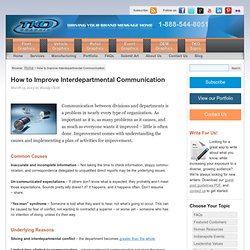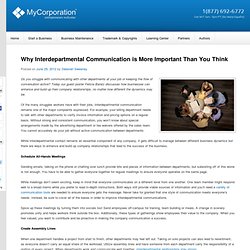

Be a Cross-Functional Whiz. In every company I’ve ever worked for, interdepartmental communication has been a problem.

Groups are viewed as silos instead of a part of a single well-integrated organization. Therefore, it stands to reason that the person who interacts seamlessly across departments would be a valued team member – a team member whom your group relies on to get things done and is least likely to be sacrificed in a layoff. How can you be that person? Here are some ideas: E-mail your contacts from orientation During the day or two you spent with HR at the beginning of your tenure, was there anyone who seemed interesting and went on to work in a different discipline? Study the other departments In order to be a cross-functional whiz, it helps to have a solid understanding of what the other groups in your organization do.
For example, if you want to establish a better relationship with R&D, learn about the product pipeline and attend a voluntary meeting of the innovation committee. Engender cooperation. How Consultants Get Buy-In Across Departments. Effective Communication Across Department Lines. Communicating is easy, right?

The person doing the talking thinks it is! They state their message. Done! The problem is on the other side … how is that message interpreted? This is especially true when communicating across departments. The book, The Geek Gap, provides a great example. Knowing how to close the gap is a critical skill for your company’s sake, but also for your own professional advantage. First, seek to understand. Now think about your stereotypical manager. Obviously, we are grossly oversimplifying here. But let’s continue stereotyping to keep making the point! Geeks see technology as an end unto itself.
To geeks, the goal is to build that perfect product or system that functions just the way it was designed. Each side needs to learn to respect the point-of-view of the other. The craftsman won’t quit until the end product is virtually perfect. The manager won’t quit until the goal is met. Geeks need the suits or they wouldn’t have any projects to work on. Related posts. The Most Undervalued Analytics Tool: Communication [Across Departments] In this series of posts, I look at how you can communicate better within your team, with other departments, with executives and with external partners.
![The Most Undervalued Analytics Tool: Communication [Across Departments]](http://cdn.pearltrees.com/s/pic/th/undervalued-communication-82840730)
My advice is based on what I’ve found successful in my own experience. Have other ideas to improve communication? Please add them in the comments, or email me. Part 2: Communication across departments While communication amongst analysts can be lacking, communication across departments can also cause challenges. So how can you improve on this? 1. Location can play a role too. 2. So how do you get invited, if you’re not currently being looped in? 3. 4. On the client side, I worked with our Enterprise Data Warehouse teams on some large data warehousing and BI projects.
Bribery probably sounds bad, but it really comes down to just showing others that you appreciate what they are doing for you. Next post: Communication with executives and stakeholders. The Discovery Surveys, Inc. - Improving The Workplace. How to Improve Interdepartmental Communication. Communication between divisions and departments is a problem in nearly every type of organization.

As important as it is, as many problems as it causes, and as much as everyone wants it improved – little is often done. Improvement comes with understanding the causes and implementing a plan of activities for improvement. Common Causes Inaccurate and incomplete information – Not taking the time to check information, sloppy communication, and correspondence delegated to unqualified direct reports may be the underlying issues. Un-communicated expectations – If others don’t know what is expected, they probably won’t meet those expectations. “Yes-man” syndrome – Someone is told what they want to hear, not what’s going to occur.
Underlying Reasons Siloing and interdepartmental conflict – the department becomes greater than the whole. Why Interdepartmental Communication is More Important Than You Think - Mycorporation's Weblog. Do you struggle with communicating with other departments at your job or keeping the flow of conversation active?

Today our guest poster Felicia Baratz discusses how businesses can enhance and build up their company relationships, no matter how different the dynamics may be. Of the many struggles workers have with their jobs, Interdepartmental communication remains one of the major complaints expressed. For example, your billing department needs to talk with other departments to verify invoice information and pricing options on a regular basis. Without strong and consistent communication, you won’t know about special arrangements made by the advertising department or fee waivers offered by the sales team.
How to Improve Interdepartmental Communication.